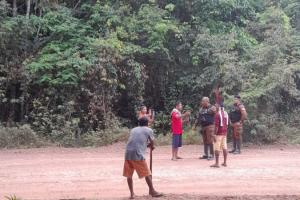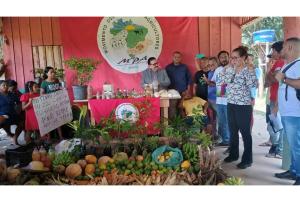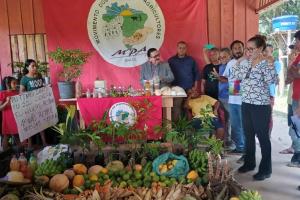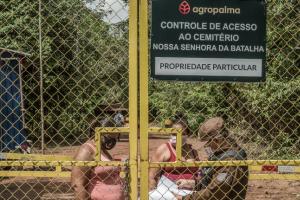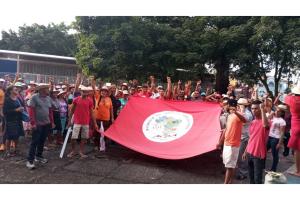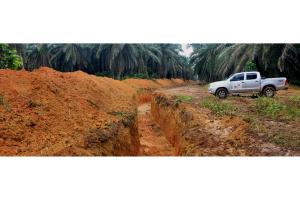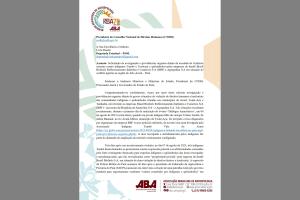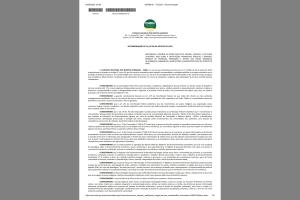In the upper Acará River in Pará, in the Brazilian Amazon, Turiwara indigenous people are defending their territory against the oil palm monoculture company Agropalma, that invaded the lands. The Turiwara fear for their lives due to the presence of company guards and other heavily armed people, frightening them.
The struggle for land in northeast Pará, in the Brazilian Amazon
In the region of the Acará River Valley, in Pará state, the Tembé and Turiwara indigenous peoples and quilombola and peasant communities are fighting to take back part of the territory they traditionally held. Monoculture oil palm plantations owned by Brasil BioFuels (BBF) and Agropalma, as well as ore pipelines owned by Norsk Hydro and Imerys, have invaded their territories and threaten to take over even more land. The struggle of these peoples and communities is not just for territory; it is a struggle to reverse a history of oppression and injustice. Today, they denounce the structural violence they face and the omission of the State.
Action alerts
5 September 2024
National and international organizations sent an letter to Brazilian authorities to demand urgent protection for the Turiwara indigenous people of the upper Acará River, in Pará, who are suffering violence and serious threats from Agropalma company.
Action alerts
23 August 2024
Since Monday, 22 August, the Turiwara people in the municipality of Tailândia, in the Brazilian Amazon state Pará took back their territory, illegally in the hands of the industrial oil palm company Agropalma.
Bulletin articles
22 August 2024
Peasant families are threatened with eviction by Brasil Bio Fuels (BBF) oil palm plantation company, with the complicity of the state government. This article shows that the much spoken of ‘bioeconomy’ is not ‘sustainable’ and even less ‘clean’. What it does is destroy communities’ territories, just like fossil fuel-based extractive industries have been doing for a long time.
Articles
12 June 2024
São famílias da Comunidade de Virgílio Serrão Sacramento no município de Moju (estado do Pará, Brasil) que coletivamente somam forças desde o final de 2015 quando reocuparam o território conhecido pela ação dos grileiros, no qual já fizeram várias vítimas. Desde então, o Acampamento ocupa sua terra com moradias, plantações, produção e fornecimento de alimentos.
Action alerts
6 May 2024
Oil palm plantations are spreading like wildfire across the eastern Brazilian Amazon. But local communities are standing up to the palm oil industry’s brutality and sweeping land grabs, demanding the return of their ancestral lands and calling on the authorities to protect them from encroachment and violence.
Articles
2 April 2024
Brazil’s Small Farmers’ Movement (MPA) has written to the state of Pará’s authorities requesting that they urgently regularize the land tenure of three peasant communities threatened with eviction. The letter has the support of 60 organizations from several countries.
Bulletin articles
26 February 2024
In the Acará Valley, Pará state, the Tembé and Turiwara indigenous peoples, and quilombola and peasant communities are fighting to take back part of the living spaces they traditionally occupied. It is not just a struggle for territory, but one to reverse a history of oppression and injustice. Today, they are denouncing structural violence and state omission.
Articles
24 February 2024
Between August 4 and 7, 2023, there were violent attacks on the lives of four indigenous Tembé people as a consequence of the struggle to take back territories from the hands of the company Brasil BioFuels (BBF). In the face of this, the Brazilian Anthropological Association (ABA) sent a formal letter to the authorities requesting the immediate regularization of indigenous and quilombola territories, as well as an investigation into the mechanisms of criminalization of their leaders and the suspension of all incentives to companies involved in the violence.
Articles
24 February 2024
On August 8, 2023, the National Human Rights Council (CNDH) sent a recommendation to federal and state authorities regarding measures to protect, promote and defend indigenous peoples and quilombola, riverine, peasant and agro-extractivist populations in Pará state.
